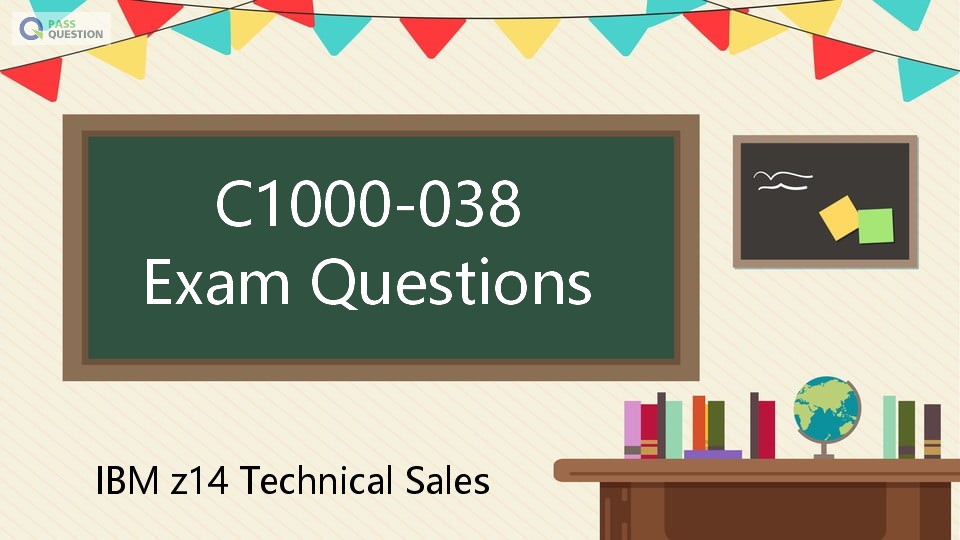C1000-038 Exam Questions - IBM z14 Technical Sales
Want to pass C1000-038 IBM z14 Technical Sales exam? PassQuestion has the right solutions for you to pass your IBM C1000-038 Exam with confidence. The latest IBM C1000-038 Exam Questions from PassQuestion can help you get to know what will occur in the real C1000-038 test. The high accuracy of C1000-038 questions and answers can help you pass the exam successfully, 100% guarantee to pass C1000-038 IBM z14 Technical Sales exam.

C1000-038 Exam Overview - IBM z14 Technical Sales
C1000-038 IBM z14 Technical Sales exam is the required exam for IBM Certified Specialist - z14 Technical Sales V2 certification.The target audience for this certification includes those who are responsible for supporting and selling IBM Z solutions. The successful candidate will have approximately 3-5 years of experience supporting IBM Z servers and solutions. There are 45 questions totally in the real test, the time duration is 90 minutes, you need to answer 29 questions to pass this exam.
C1000-038 Exam Topics
IBM Z Features and Architecture 36%
- Describe currently marketed IBM Z processors, operating systems (z/OS, z/VM, z/VSE, z/TPF, and Linux), and related system software, middleware, and compilers.
- Describe IBM Z specialty engines (IFL, zIIP, ICF, IFP and SAP processors) use and benefits.
- Describe IBM Z models.
- Describe IBM Z permanent and temporary capacity offerings (CoD, Capacity Provisioning, CBU).
- Describe IBM Z security offerings (RACF, PKI, CPACF and Crypto Express, TKE, Pervasive Encryption, Multi-factor authentication, IBM Secure Service Container, EKMF).
- Describe IBM storage compatibility options for IBM Z and LinuxONE.
- Describe IBM Z connectivity options (I/O such as FICON, OSA, RoCE, zHyperlink and Coupling Options such as Infiniband, Integrated Coupling Adapter, Coupling Express Long Reach).
- Describe IBM Z performance improvements (HiperDispatch, zHPF, Out of Order Execution, Virtual Flash Memory, Large Memory, zEDC, Guarded Data Facility, zHyperlink).
- Describe IBM Z systems management (HMC, SE, zOSMF, SMF, RMF, IBM WAVE, STP, SSC etc.).
- Describe software pricing options under z/OS, z/VM, and Linux on IBM Z and LinuxONE, including container and consumption-based pricing.
- Describe IBM Z virtualization (PR/SM, z/VM, DPM, KVM).
- Describe IBM Z architectural enhancements (SIMD, SMT, new instructions, Chip/Cache structure, PCIe, IFP, Secure Service Container, RAIM, VFM).
- Describe LinuxONE models (e.g., Emperor II and Rockhopper II).
- Describe Pervasive Encryption functionality and its benefits.
- Describe potential uses of the 16U space feature for the z14 ZR1 - e.g. integrating storage, switches and other devices.
Evaluate Customer Environment and Plans 13%
- Evaluate and document current customer environment (equipment, software, staff usage, satisfaction, need for change and growth).
- Identify opportunities (Business Resilience, Workload Consolidation, Pervasive Encryption, MFaaS, DBaaS, DevOps, etc.).
- Distinguish studies using tools (zPCR, zCP3000, zBNA, zSoftCap, zTPM, FICON Aggregation, Coupling Facility Analysis) methods, and processes to solve customer business problems.
- Determine which tools are used to compare different platforms: Sizing, TCO analysis, etc., IT Economics [formerly Eagle study], Fit for Purpose).
Apply Information/Installation Planning / Migration Considerations 13%
- Create accurate configuration for hardware; identify software and services based upon the needs and expectations of the customer.
- Identify areas of risk to discuss with customer, relevant business partner(s), and IBM team: I/O options, Withdrawn from Marketing, future planning and availability, drawers for cards: z14/z14 ZR1 Sysplex compatibility.
- Create a mutually developed implementation plan with the customer, including post install.
- Describe and implement consolidation methodology.
- Execute the Technical Delivery Assessment (TDA) process.
Business Resiliency 13%
- Identify the elements of High Availability which enable an IBM Z environment to remain up and running without unscheduled outages (e.g., elements unique to single system environments, or multiple system environments in a single location, and multi-system-multi-location environment).
- Identify the elements of Continuous Availability which enable an IBM Z environment to remain up and running without any outages (planned or unplanned).
- Identify the elements of a Disaster Recovery solution which affect the ability of the business to continue to run.
- Explain Recovery Time Objective (RTO) and Recovery Point Objective (RPO) and identify the technologies that support these objectives.
- Identify IBM Z business resilience options and their capabilities, and alternative offerings, including (but not limited to) IBM BCRS and GDPS.
- Given specific customer criteria and requirements, propose the appropriate Business Resilience solution, product, or process.
IBM Z Solutions: Security, Cloud, Analytics, SSC 25%
- Identify the elements in an IBM Z environment that protect networks, data, and applications (e.g., Pervasive Encryption, CF encryption, Disk/Tape Encryption, Data Set/file system Encryption and database encryption and application encryption).
- Identify common methods to reduce risk exposure, in encryption and cryptography.
- Discuss solutions to exposures in the customer security environment in data security (encryption, data-at-rest, data-in-motion, permissions/access, multi-factor authentication, z/OS Encryption Readiness Technology, etc.).
- Discuss solutions to exposures in the customer security environment in data security (encryption, data-at-rest, data-in-motion, permissions/access, multi-factor authentication, z/OS Encryption Readiness Technology, etc.).
- Position cloud solutions (elements that are unique to IBM Z such as cryptography, RAS, Capacity on Demand, private versus public cloud) on IBM Z that differentiate it from cloud solutions on other platforms).
- Describe Hybrid Cloud characteristics (e.g., hybrid offerings, Linux and containers on the cloud).
- Describe the unique values of data intensive workloads running on IBM Z including reliability, availability, security and scalability.
- Identify services that run in an SSC VM hosted on IBM Z/LinuxONE offered via IBM Cloud (e.g., Blockchain, IBM Cloud Hyper Protect).
- Describe openness on the IBM Z platform (Mongo DB, Database as a service, etc.).
- TOP 50 Exam Questions
-
Exam
All copyrights reserved 2025 PassQuestion NETWORK CO.,LIMITED. All Rights Reserved.

